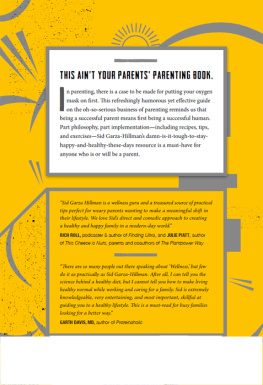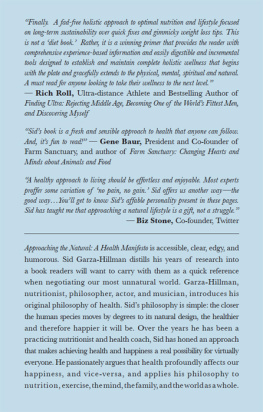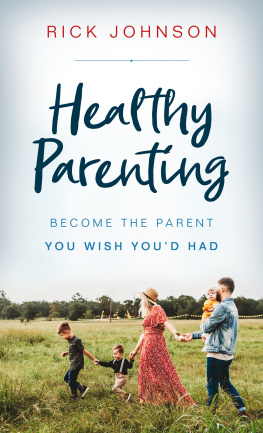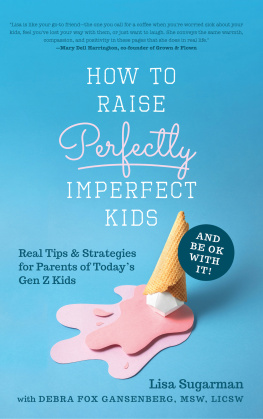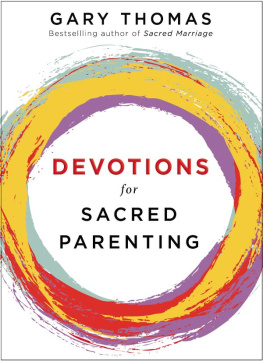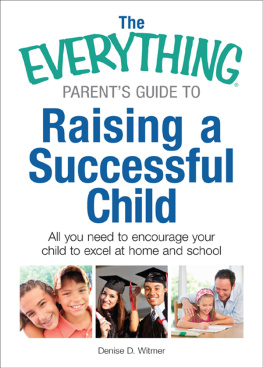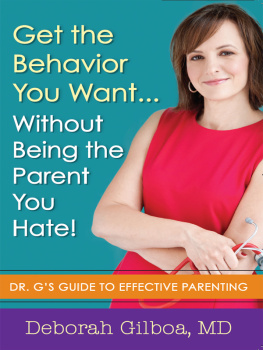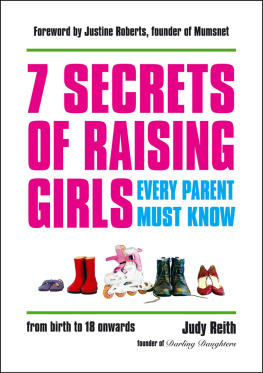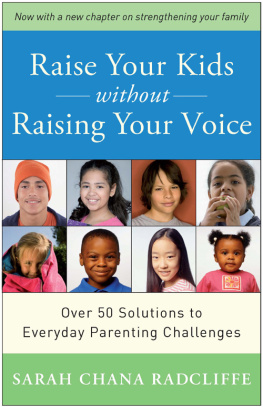Parenting will never be easy. But it can be a heck of a lot more rewarding, enjoyable, and effective with the right mind-set and communication strategies. Raising Healthy Parents is a sane, funny, and eminently practical guide to the journey of a lifetime. If your parenting could use an infusion of joy, clarity, and compassion, Sid is your guide, and Raising Healthy Parents is your users manual.
HOWARD JACOBSON, PHD, host of The Plant Yourself Podcast, contributing author to Proteinaholic and Whole
Small Steps for the win! For achieving a healthier, happier family, youve found the best approach for creating lasting change and the best person you could have chosen to be your guide on this journey.
MATT FRAZIER, author of No Meat Athlete and The No Meat Athlete Cookbook
A fun, easy-to-read, practical parenting book that cuts the crap and gimmicks to focus on the real goal: happiness. Sid Garza-Hillmans approach centers around becoming a happy and well-balanced parent, and, in turn, raising healthy, thriving, and yes, happy children. A must-read for new parents like myself.
DOUG HAY, founder of Rock Creek Runner and cohost of No Meat Athlete Radio
As parents, we are inundated with information about how to raise our children but receive little, if any, guidance on how to raise ourselves. Healthy, active, well-adjusted parents are more resilient and better suited to the task of child-rearing and LIFE. Sid Garza-Hillman walks us through the process of achieving this end in a practical, realistic, no BS way.
AARON STUBER & JACKSON LONG of Thought For Food Lifestyle
Parenting is an imperfect art. Its not about following the latest model for modifying childrens behaviors; its about the parents. In his charismatic tone, Sid sets an example for parents to first understand more about themselves in order to build a healthy family. Whether your children are just a glimmer in your eye or getting ready to flee the nest, this is a must-read that will create a positive transformation for you, your home, and your family.
ADAM & SHOSHANA CHAIM, cohosts of The Plant Trainers Podcast







by Matt Frazier

I ts easier than ever to be a parent... just like its easier than ever to nourish ourselves with food.
Start with the food. We live in an era of unprecedented nutritional convenience, where thousands of calories sit waiting to be consumed in airtight packages, right in our pantries. Should we find those options unsatisfactory, our next meal is only a short drive away at a local fast-food spot (no need to even get out of the car). And those times were feeling really lazy, it only takes a few taps on the smartphone to ask for hot food to be delivered right to our door.
A far cry from having to grow, gather, or hunt our food. Oh, and then having to eat it in the short window before it spoils. And, sometimes, not to be able to eat at all for a few hours. Or even a few days.
And yet, for all the ease of nourishing ourselves in todays world, were fatter and sicker than weve ever beenI mean, like, global epidemic level.
Similarly, technology makes it easier than ever to be a parent. One need only search YouTube for kids show 3 hours to find exactly that (yes, they put the length right in the title for you). The cheapest babysitter on the planet, and shes available on short notice... even on weekends.
Long car ride? Bring the tablets. (If the screens arent already installed in the seats, of course.)
Thanks to the miracle of modern technologyand that food bit we already talked aboutits conceivable that one could raise kids that survive without ever having to see or hear them, once theyre old enough to swipe and pinch. (Which, if youve ever had the astonishing experience of watching a toddler navigate an iPhone, you know isnt very old.)
Yep... easier than ever.
While were starting to get a clear picture of what the convenience-food lifestyle does to our health, the impact of digital babysitting remains to be seen. But do we really have to wonder how itll turn out?
In his first book, Approaching the Naturalone of my favorites, that Ive given to (literally) hundreds of peopleSid Garza-Hillman argues that we need only look to nature to discover the optimal ways to eat, move, and live for longterm health and short-term happiness.
We all agree that in the modern world its not always practical to go barefoot and forage for our food. But if we can only approach this ideal, say, by buying fresh produce and moving our bodies more often, then were making a dramatically better choice than the current default, without going full-caveman.
And its exactly the same when it comes to parenting. Just like our bodies have evolved to thrive on real, actual foodthe only way we used to be able to eat, periodour kids minds (and bodies, too) are optimized for the way kids used to be raised. I dont mean the good ol days, with a white picket fence, dinner at 5:00 pm sharp, and stickball in the vacant lot down the street until then. I mean much, much further back than that: the caveman days. But remember, we only need to approach the ideal to find the sweet spot between modern and optimal that best allows us (and our children) to thrive in todays world.
I have two children, a boy and girl, aged seven and four as I write this. And because my wife and I have raised them while coming to understand the approaching the natural way of thinking about food, it has been fairly easy to make the leap and allow this philosophy to extend into our parenting.
My children both eat a healthy diet, even though they understand that they have a choice in the matter. How do we get them to make good choices? Actually, its been surprisingly stress-free. My wife and I talk to them often about why we choose to eat this way; they help in the garden and even, now and then, in making foods like fresh pasta from scratch. They understand where food comes from, and their taste buds havent been blasted with artificial flavors or unnaturally sweet, salty, or fatty foods.
If the opportunity to eat a way-less-than-healthy cupcake at a school birthday party presents itself and no healthier option is available, they understand they can do what they want. (And what they want, almost always, is the choice to eat the way they do when theyre with us.)
This is our way of approaching what we think is pretty darn natural, without making them go dig up a sweet potato from the ground every day for lunch. And in staying flexible, we hopefully avoid most situations where they need to feel stress or, even worse, guilt.
To take another example, until just a few weeks ago my kids slept in the same room. It wasnt that we didnt have the space for separate rooms; instead, we wanted them to be able to hear and take comfort in the sound of another human being breathing when they woke up at night in the dark. The way it used to be, by default.
Next page
